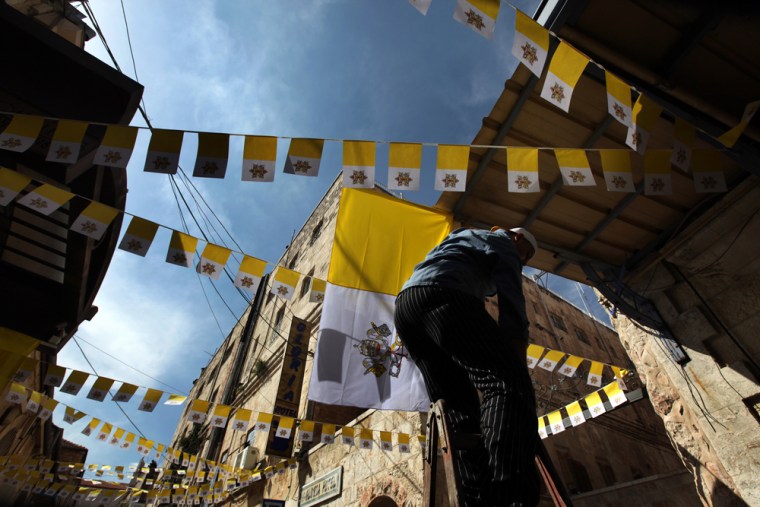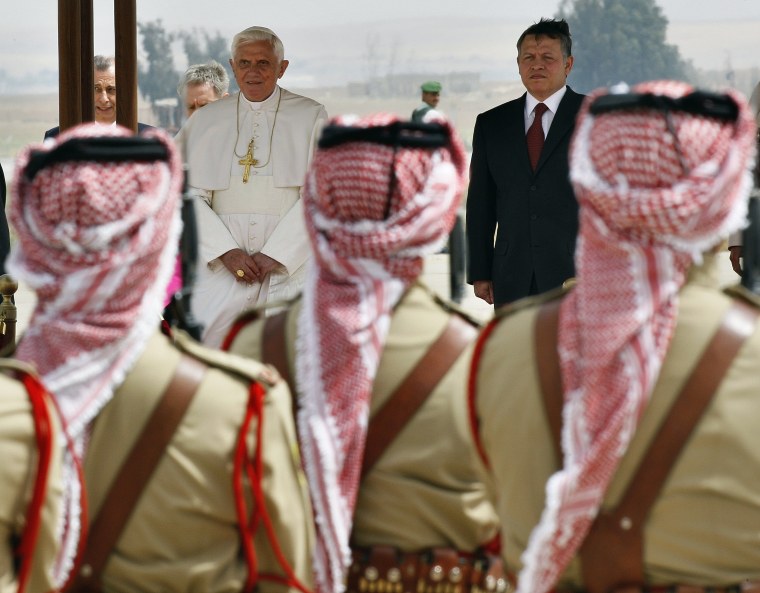Pope Benedict XVI began his first trip to the Middle East on Friday, expressing his "deep respect" for Islam and hopes that the Catholic Church would be a force for peace in the region as he treaded carefully following past missteps with Muslims and Jews.
The pope was given a red-carpet welcome at the airport by Jordan's King Abdullah II and Queen Rania and praised the moderate Arab country as a leader in efforts to promote peace and dialogue between Christians and Muslims. An honor guard wearing traditional red- and white-checkered headscarfs played bagpipes and waved Jordanian and Vatican flags.
The trip to the Holy Land is the first for the German-born Benedict, who will travel on Monday for a much-anticipated four days in Israel and the Palestinian territories. Despite the lavish welcome ceremony, the pope has faced sharp criticism in the Middle East — by both Muslims and Jews.
Benedict angered many in the Muslim world three years ago when he quoted a Medieval text that characterized some of Islam's Prophet Muhammad's teachings as "evil and inhuman," particularly "his command to spread by the sword the faith.
Earlier this year, he sparked outrage among Jews when he revoked the excommunication of an ultraconservative bishop who denies the Holocaust.
"My visit to Jordan gives me a welcome opportunity to speak of my deep respect for the Muslim community, and to pay tribute to the leadership shown by his majesty the king in promoting a better understanding of the virtues proclaimed by Islam," Benedict said shortly after landing in Jordan, a mostly desert country where Moses is said to have viewed the Promised Land.
He said Jordan was in the forefront of efforts to promote peace, inter-religious dialogue and to "curb extremism."
Later at a Catholic center for the handicapped, he said his only agenda was to bring hope and prayers "for the precious gift of unity and peace, most specifically for the Middle East." But his past comments continue to fuel criticism by some Muslims.
Key Muslim group objects to visit
But his past comments continue to fuel criticism by some Muslims, even though the pope said he was sorry and that the quotes did not reflect his personal views.
Jordan's hard-line Muslim Brotherhood said Friday before the pope arrived that its members would boycott his visit because he did not issue a public apology ahead of time as they demanded.
Brotherhood spokesman Jamil Abu-Bakr said the absence of a public apology meant "obstacles and boundaries will remain and will overshadow any possible understanding between the pope and the Muslim world."
The Brotherhood is Jordan's largest opposition group. Although it commands a small bloc in parliament, it wields considerable sway, especially among poor Jordanians.
A radical Islamic cleric who was once the spiritual mentor of the late Jordanian-born al-Qaida in Iraq leader Abu Musab al-Zarqawi also urged Muslims not to forget Benedict's comments.

"Whoever is welcoming this transgressive liar and dignifies him and honors him and overlooks his offensives toward the prophet of Islam and toward his religion, then it is impossible for him to be a person from the Muslim community of Muhammad by any means," Abu-Mohammed al-Maqdisi said, according to a transcript released by the SITE Institute, a U.S. group that monitors terror messages. Al-Maqdisi fell out with al-Zarqawi for the militant's killing of civilians in Iraq and Jordan, but the cleric remains influential among some extremists.
'Ideaologies of division'Before landing in Amman, Benedict expressed hope his visit and the power of the Catholic church would help further peace efforts between Israelis and Palestinians.
"We are not a political power but a spiritual power that can contribute," Benedict told reporters aboard the plane. The traditional news conference was scaled down with the Vatican spokesman asking the questions based on previously submitted questions from reporters. In the past, some of his answers have stirred controversy, but he appeared to avoid that.
Asked about Catholic-Jewish relations, he said the two religions had common roots and that it should be "no surprise" that there were misunderstandings during 2,000 years of history.
Jordan's king praised the pope and said the world must reject "ambitious ideologies of division."
"We welcome your commitment to dispel the misconceptions and divisions that have harmed relations between Christians and Muslims," said Abdullah.
Abdullah Abdul-Qader, a cleric at Amman's oldest mosque, told worshippers during Friday prayers to welcome the pope's visit. "I urge you to show respect for your fellow Christians as they receive their church leader," said Abdul-Qader at the Al-Husseini mosque.
Christians make up 3 percent of Jordan's 5.8 million people.
Meeting with Muslims
Benedict's three-day stay in Jordan is his first visit to an Arab country as pope. He is scheduled to meet with Muslim religious leaders at Amman's largest mosque — his second visit to a Muslim place of worship since becoming pope in 2005. He prayed in Istanbul's famed Blue Mosque, a gesture that helped calm the outcry over his remarks.
The pope is also expected to meet Iraqi Christians driven from their homeland by violence. About 40 young Iraqi refugees crowded into a tiny Catholic church in Amman on Friday, nervously practicing their last lesson before Benedict administers their first communion on Sunday.
"I really want to meet the pope," said Cecile Adam, an 11-year-old whose family fled Baghdad. "I think he can do something to help Iraq because Jesus gave him a good position and Jesus wants us to be happy."
More on Vatican
